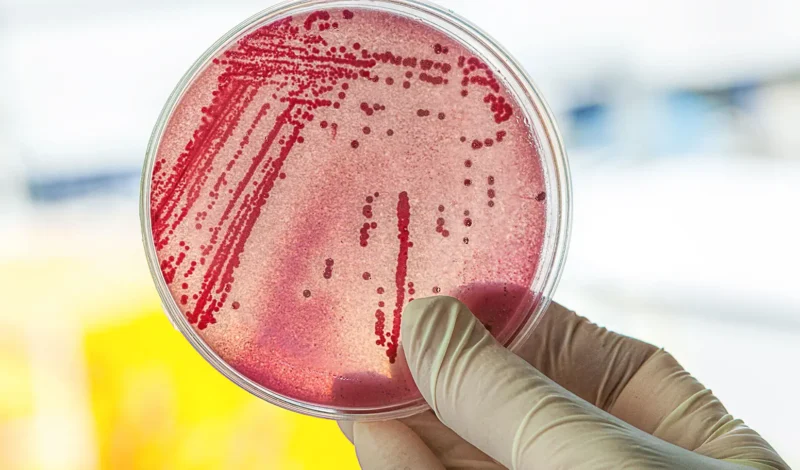Nutrition plays an important role in strengthening your intestinal flora and keeping your intestines healthy. After all, every food you eat [...]

The specific immune response – what is it actually?
The immune system is the bouncer of your body. It decides who gets in and who gets out. And your immune system is very complex. Two different guards put a stop to uninvited guests like viruses, fungi and parasites: the unspecific and the specific immune response.
The unspecific or innate immune response is known to most people. From birth, the chemical-physical protective barrier keeps intruders away from us. But what is actually the specific immune response?
The specific immune response is the memory of your defences
In contrast to the unspecific immune response, the specific immune response is not put into your cradle. Your immune system has to learn the specific reaction first. This is why it is also called “acquired immune defence“. This does not happen overnight: the development of the specific immune response is a lifelong learning process.
And this is how it works: If your organism comes into contact with a specific pathogen, it not only forms antibodies that match the pathogen exactly, but also stores the information about the pathogen. If it comes into contact with it again, it retrieves the information from the database of the specific immune response system: it knows who it is dealing with and can react faster and more strongly to the troublemaker.
What does the specific immune response have that the non-specific one does not?
If the body’s first attempt at defence by the innate immune system fails, the acquired immune system must intervene. However, it can take between four and seven days before it is set in motion. Thus, the specific immune response takes longer than the non-specific immune response, but it is worth the wait. After all, the acquired immune system has a higher accuracy than the innate one.
This is because it remembers attackers – and it is this ability to remember that makes it so effective. It specifically fights a particular intruder. While the non-specific responses do not know the identity of the pathogen and only set general protective mechanisms in motion, the specific ones know exactly what to do and initiate the appropriate defensive reaction.
But where does the specific immune response system get its memory capacity from? So-called memory cells make them possible. On first contact with the previously unknown pathogen, the symptoms of the disease are still very pronounced. Our body needs a few days to set in motion a corresponding defence reaction. With new infections it is different: Either the symptoms do not set in at all or they are much weaker than the first time. This also explains why you only get certain diseases once in your life. Once you have overcome them, you are immune to them.
What belongs to specific immune response?
The specific response system sends out various helpers to render the pathogens harmless. They take over different functions in your immune system.
The T lymphocytes, which belong to the group of white blood cells, are responsible for the cellular immune defence in the tissue. They register infected cells and banish them from the body.
They are formed in the bone marrow. As they develop into finished cells in the thymus gland, they learn their craft: to distinguish between the body’s own cells and foreign cells. On their surface, they are equipped with special recognition features to which pathogens can dock according to the lock-and-key principle.
When this happens, the affected T cells multiply rapidly. In doing so, they trigger strong defence reactions which drive the pathogens out of the body.
The B-lymphocytes also participate in the specific immune defence. They build up antibodies that mix into the blood as soluble proteins and are directed at exactly one pathogen.
However, the two lymphocyte types do not stand alone, they work closely together. Either they communicate directly during binding to the defence cells or via soluble messenger substances such as cytokines.
Strengthening the immune system – a push in the right direction
T and B lymphocytes are doing fine. Nevertheless, they are happy to have your support. Even with simple means you can help your body to fight pathogens:
- reduce stress, for example with yoga, Pilates or meditation
- fill up with fresh air and vitamin D
- get plenty of exercise (at least once a week)
- go to the sauna regularly
- sleep at least seven hours a day
A strong intestinal flora is also important, as it is a crucial part of our immune system. If it weakens, the defence against pathogens no longer functions optimally.

With the self-test INTEST.pro from BIOMES you can find out whether your intestinal flora is in balance or whether it needs some “tuition” so that it can fulfil its functions optimally and make its contribution to the immune defence. Simply take a stool sample at home with the test kit, send it to BIOMES and have the sample analysed by the scientists*. You will then receive the evaluation. Based on this, the BIOMES experts will be happy to draw up personalized recommendations for you.
With the evaluation of your INTEST.pro you receive information about your intestinal flora and learn how you can increase your quality of life.
You can get more information about our test kit and the analysis here.
- Sources:
- Engin A. (2017) The Definition and Prevalence of Obesity and Metabolic Syndrome, vol 960. Springer, Cham. doi: 10.1007/978-3-319-48382-5_1
- Adipositas | Apotheken-Umschau
- WHO. (2000) Obesity: preventing and managing the global epidemic. WHO Technical Report Series 894.
- Wirth, A & Hauner H. (2013) Adipositas. Springer. 4. Auflage


